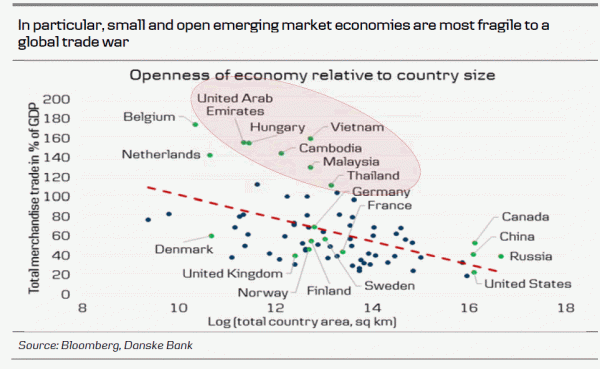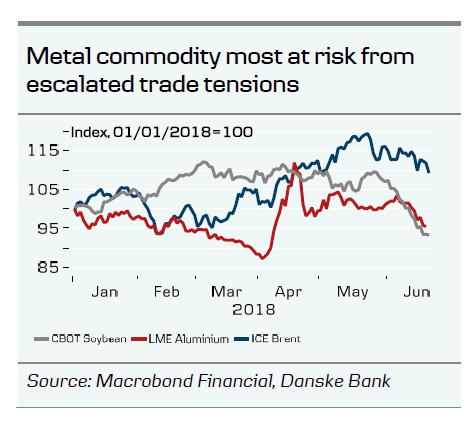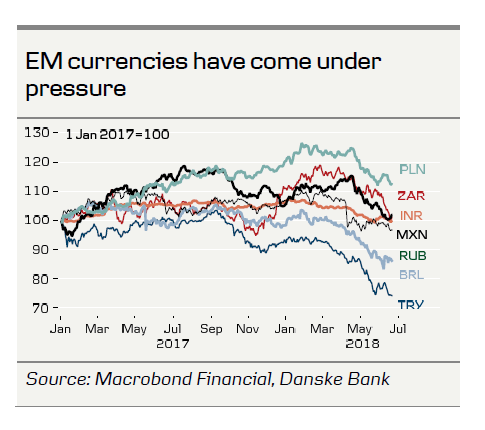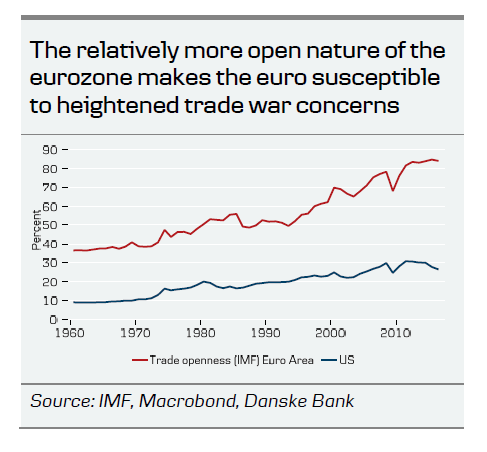Todays key points
- A further escalation of the trade tensions has become our baseline scenario ahead of 6 July.
- The escalation will weigh on global economic growth.
- Equity volatility will be high, with downside risks for equities near term.
- Industrial and agricultural commodities are primarily at risk.
- The prospects of a stronger USD, lower commodity prices and weaker global growth weigh on emerging markets
Rising risk of a full-blown trade war
Rising risk of a full-blown trade war This week saw a dramatic escalation of the trade dispute between the US and China. The US administration upped the rhetoric against China by saying that if China retaliates against the new US tariffs on 6 July, the US is prepared to slap additional 10% tariffs on up to USD400bn of Chinese exports to the US. The Chinese side has clearly signalled a readiness to respond with equal measures ). With no negotiations in sight at the moment, our base case is shifting to a further escalation of the trade conflict between the two countries. There is a risk of deterioration in relations between the two sides already on 30 June when the US is due to announce its plan to restrict Chinese investments into the US and to limit exports of US tech products to China.
Can such an escalation be avoided? We remain sceptical. Firstly, there appears to be little trust between the two sides, notably on the Chinese side, after the US turned its back on the negotiated trade deal last month. Secondly, Trump is increasingly leaning towards trade and China hawks such as Peter Navarro, US Trade Representative Robert Lighthizer and National Security Advisor, John Bolton. However, Trump has previously made sudden changes in tactics (think of North Korea and this week on immigration), but we still only assign a 10-20% probability for new negotiations and a possible defusing of the trade tensions between the two sides.
Trade tensions between Europe and the US are also at risk of escalating. The EU has adopted a 25% tariff on EUR2.8bn of US goods (jeans, motorcycles, Bourbon whisky and several commodities) today in response to the US tariffs on steel and aluminium import from EU countries. This may well trigger countermeasures from Trump as with China, which could include tariffs on European car exports (read: from Germany) causing another retaliation from the EU and so on. Several emerging market countries such as Turkey, India and Russia have recently adopted countermeasures to US steel and aluminium tariffs.
Downside risks to global growth from escalation of trade tensions
We think global growth is likely to take a sizable hit from an escalation of the trade war between the US and China (and possible other countries). In the event of US tariffs on USD450bn of Chinese goods and China retaliation with measures of equal size, both exports between the two countries as well as business confidence will be hit, hampering investments and consumer spending, also globally. The impact of a more restrictive global trade regime will be felt most acutely in surplus countries (i.e. China, manufacturing Emerging Markets and Germany). We see the risk of a fall in global growth of between 0.25-0.50% (assuming central banks weather part of the shock).
Indeed, central banks are starting to sound concern about the economic outlook in face of the risk of an escalation in trade tensions. This became clear at this week’s gathering of global central bankers at the Sintra conference in Portugal. Fed Chair Jerome Powell said that trade tensions “could cause us to have to question the outlook”, while the ECB’s Mario Draghi said that “for the first time we are hearing (from business leaders) about decisions to postpone investment, postpone hiring, postpone making decisions.” The Chinese central bank signalled this week a possible monetary policy easing perhaps already this weekend in response to the possible hit from the trade frictions with the US. In our view, other large central banks could take similar steps should growth weaken materially in the wake of trade restrictions. With uncertainty on the trade relations between major economies, we think volatility in equity markets will be markedly higher. There would be downside risk for equities in the event of an escalation of trade tensions.
Industrial and agricultural commodities are primarily at risk
An escalation of the trade war creates a downside risk to commodity prices. Prices on industrial commodities, e.g. aluminium and steel, and agricultural commodities, e.g. soybean, will suffer directly from the imposed tariffs, which will reduce global demand for these commodities. If an escalation leads to a significant setback in the total volume of global trade, then oil prices are also at risk as fuel demand in shipping would take a hit.
Emerging markets vulnerable to trade tensions
Emerging markets were already on the back foot before this week’s growing trade war concerns. Investors had become more cautious in the wake of higher US rates and USD especially the more vulnerable EMs like Turkey, Brazil and Argentina. And this week’s rising risk of global trade war certainly hasn’t helped. We think sentiment toward EMs will remain fragile until 6 July, when the trade war between the US and China could escalate. If the trade war indeed broadens, manufacturing EMs with high export exposure would suffer the most (Eastern Europe and Asian countries in particular). Poland has a bigger domestic market than other CEE economies, which will ease the trade war impact on PLN. It should, however, be noted that the macro situation in emerging markets is generally stronger than ten years ago, boasting lower inflation, less FX exposure, advanced adjustment to Fed tightening, more independent central banks and a larger share of multilateral trade with other EM partners. Should the chance of negotiations between the US and China re-appear, the EM could see a significant relief rally.
Euro susceptible to an escalation in trade tensions.
With the risk of a more wide-raging trade war rising lately, the risk of its FX implications shifting has risen. At the start of the year the trade dispute was largely associated with a political push for a weaker dollar – and if anything helped to add to the ‘America first’ risk premium, which Trump has in our view introduced on USD. But as the risk of a bigger hit to confidence and activity globally is looming, the open euro-area economy may be up for a bigger hit growth-wise than the US, which could in turn weigh on EUR/USD (even if the ECB has been arguing the opposite, see speech by Benoît Coeuré, a April 2018). We still think the cross is capped largely at 1.15 but a possible global trade war (especially if the US decides to impose further tariffs on EU goods this weekend), uncertainty about Italy and higher USD carry remain downside risks.




